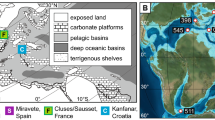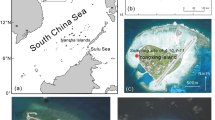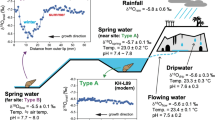Abstract
THE understanding of global temperature conditions during the Tertiary period has greatly increased in the past decade owing to the successful oxygen isotope investigations of the numerous deep sea cores now available. Little attention has been paid, however, to applying the method to material from shelf sea areas, where the temperature-induced 18O-record in carbonate shells are generally believed to be superimposed by 18O-variations in water composition and by postdepositional alterations. This is unfortunate, as oxygen isotope data from coastal areas provide the best way of comparing traditional palaeoclimatological methods with the oxygen isotope procedure. The present study, which deals with the oxygen isotope composition of shell material from the Tertiary North Sea area, was initiated to overcome this lack of data. Here the oxygen isotope results are interpreted as palaeotemperatures and the first isotopic palaeotemperature curve for the Tertiary period in NW Europe is given.
This is a preview of subscription content, access via your institution
Access options
Subscribe to this journal
Receive 51 print issues and online access
$199.00 per year
only $3.90 per issue
Buy this article
- Purchase on Springer Link
- Instant access to full article PDF
Prices may be subject to local taxes which are calculated during checkout
Similar content being viewed by others
References
Urey, H. C., Lowenstam, H. A., Epstein, S. & McKinney, C. R. Geol. Soc. Am. Bull. 62, 399–416 (1951).
Savin, S. M. A. Rev. Earth planet. Sci. 5, 319–355 (1977).
Shackleton, N. J. & Kennett, J. P. Init. Rep. DSDP 29, 743–775 (1975).
Murray, J. W. Mar. Geol. 22, 103–119 (1976).
Buchardt, B. Palaeogeogr. Palaeoclimat. Palaeoecol. 22, 209–230 (1977).
Epstein, S., Buchsbaum, R., Lowenstam, H. A. & Urey, H. C. Geol. Soc. Am. Bull. 64, 1315–1326 (1953).
Berggren, W. A. Lethaia 5, 195–215 (1972).
Graig, H. in Stable Isotopes in Oceanographic Studies and Paleotemperatures (ed. Tongiorgi, E.) 3–24 (1965).
Epstein, S. & Mayeda, T. K. Geochim. cosmochim. Acta 4, 213–254 (1953).
Graig, H. & Gordon, L. I. in Stable Isotopes in Oceanography and Paleotemperatures (ed. Tongiorgi, E.) (1965).
Thorsen, G. Geol. Soc. Am. Mem 67, 461–534 (1957).
Schwarzbach, M. Z. dt geol. Ges. 118, 33–68 (1968).
Dorf, E. Proc. North American Paleont. Convention 323–346 (1969).
Straunch, F. Z. dt geol. Ges. 123, 163–177 (1972).
Talwani, M. & Eldholm, O. Geol. Soc. Am. Bull. 88, 969–999 (1977).
Wolfe, J. A. Palaeogeogr. Palaeoclimat. Palaeoecol 9, 27–57 (1971).
Kennett, J. P. J. geophys. Res. 82, 3843–3862 (1977).
Benson, R. H. Lethaia 8, 69–83 (1975).
Author information
Authors and Affiliations
Rights and permissions
About this article
Cite this article
BUCHARDT, B. Oxygen isotope palaeotemperatures from the Tertiary period in the North Sea area. Nature 275, 121–123 (1978). https://doi.org/10.1038/275121a0
Received:
Accepted:
Published:
Issue Date:
DOI: https://doi.org/10.1038/275121a0
This article is cited by
-
Comparative chloroplast genomics of 34 species in subtribe Swertiinae (Gentianaceae) with implications for its phylogeny
BMC Plant Biology (2023)
-
Carbonate clumped isotope paleothermometry: a review of recent advances in CO2 gas evolution, purification, measurement and standardization techniques
Geosciences Journal (2015)
-
Middle Lutetian climate in the Paris Basin: implications for a marine hotspot of paleobiodiversity
Facies (2012)
Comments
By submitting a comment you agree to abide by our Terms and Community Guidelines. If you find something abusive or that does not comply with our terms or guidelines please flag it as inappropriate.



